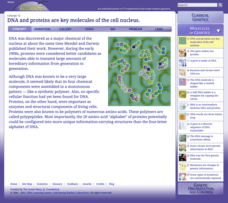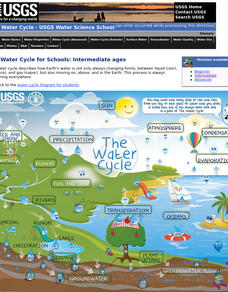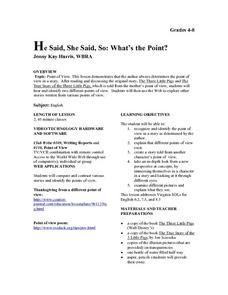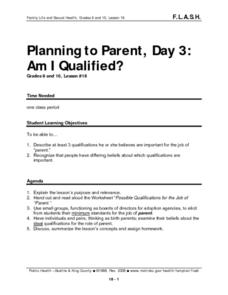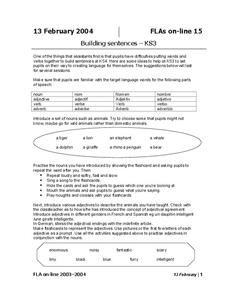EngageNY
TASC Transition Curriculum: Workshop 9
Here's a workshop for teachers that rocks the academic world! Using earthquakes as a medium for instruction, educators learn about crosscutting engineering with science. Fun, hands-on, collaborative exercises encourage participants to...
American Statistical Association
EllipSeeIt: Visualizing Strength and Direction of Correlation
Seeing is believing. Given several bivariate data sets, learners make scatter plots using the online SeeIt program to visualize the correlation. To get a more complete picture of the topic, they research their own data set and perform an...
5280 Math
Decimal Patterns
Find patterns in the process instead of the result. Learners convert series of decimals and fractions identifying patterns along the way. The lesson includes nine problem tasks with progressively more involved patterns.
New York State Education Department
US History and Government Examination: January 2017
Looking for a resource that tests both US History and government? Here's a test that serves as a great way to test comprehension of complex concepts by using a variety of question formats and covering a wide array of topics. The...
Serendip
How Do Muscles Get the Energy They Need for Athletic Activity?
Every muscle movement requires energy, but where does that energy come from? Scholars answer this question and more as they complete a worksheet. By following the directions, completing research, and discussing it as a class, they begin...
Cold Spring Harbor Laboratory
DNA and Proteins Are Key Molecules of the Cell Nucleus
When DNA research first began, it required almost an entire day to extract the molecules from a cell nucleus. Now it requires less than an hour. Scholars learn about the early theories of DNA with an online interactive, videos,...
New York State Education Department
Global History and Geography Examination: January 2016
What do the Inca Civilization, Wittenburg Church, and India's economy in the Mughal Period have in common? The well-rounded standardized test challenges scholars to remember all of them. They use different graphics and maps to answer...
New York State Education Department
Global History and Geography Examination: January 2014
Scholars write an informational essay with a practice examination. The resource includes comprehensive multiple-choice questions dealing with everything from the creation of the European Union to changes in oil prices across the globe.
Southern Poverty Law Center
Choosing Reliable Sources
It is more important than ever that 21st-century learners develop the skills they need to become savvy consumers of media. Young learners locate and identify reliable sources of information with a helpful media lesson.
ABCya
Presidents' Day Crossword Puzzle
How much do you know about the United States presidents? Put your knowledge to the test with an interactive crossword puzzle all about American government.
US Geological Survey
The Water Cycle for Schools: Intermediate Ages
Water can travel from the highest mountain tops to the largest oceans. Using an interactive, young scientists trace the movement using an interactive online resource. They follow the water cycle by reading pop-up explanations on a...
Curated OER
First Day Protocol
While this is not really a step by step lesson, it's a fabulous idea to do a presentation instead of the usual drone lecture on the first day. This project takes a little work each year to take digital pictures throughout the year to use...
Curated OER
CAN WE SWITCH GENDERS OF STORY CHARACTERS?
Analyze characters and stories to identify stereotyping. Learners will examine the concept of character gender to evaluate bias in classroom story books. They are asked to read a story or play and change the gender of the character to...
Curated OER
Sound Busters
Fourth graders engage in a study of sound pollution at their school. After a class discussion on what noise pollution is, learners are asked if they think there are areas of their school or community where noise pollution is a problem....
Curated OER
He Said, She Said, So: What's the Point?
Not by the hair on my chinny chin chin! Upper graders and middle schoolers read the story The Three Little Pigs and other tales related to the story from various points of view. They use the Internet to find more stories...
Curated OER
Christopher Columbus: The Man, the Myth, the Legend
Learn more about maps by examining Christopher Columbus's voyage to the New World. Kindergartners will learn about basic map skills and how to identify the compass rose, oceans, and land masses. They will also discover the purpose of...
Curated OER
Writing Pourquoi Tales
Complete research on Pourquoi tales and then lead your students in creating their own. This lesson accompanies another on Pourquoi Tales on our site and deals more with the writing process. Your class will put the tales together in a...
Colombia University NSEC
Lesson #3 ~ Nanoscience and Nanotechnology
Here is a six-page script for your biology, chemistry, or physics class to read out loud as a way of investigating nanoscience. This particular lesson is actually a continuation of "Lesson #2 - Nanoscience and Nanotechnology," written in...
Curated OER
Puberty/Adolescence, Day 4: "Will I Fit in?"
What are healthy friendships? What makes a friendship unhealthy? There are several worksheets for your high schoolers to do to answer some of these questions and more about their friends and ideas about friendship. Inspire some great...
Curated OER
Planning to Parent: Am I Qualified?
In small groups, teens take on different roles to discuss the qualifications for parenthood. An instruction sheet for group discussion is provided, as well as homework worksheets. Throughout these exercises, young adults take the time to...
Curated OER
A Closer look at Oil and Energy Consumption
Upper graders analyze basic concepts about the consumption, importation and exportation of the worlds oil production. They create several graphs to organize the data and draw conclusions about the overall use of oil in the world.
Curated OER
Cosmic Chemistry: An Elemental Question
Space scientists investigate the cosmic phenomena in order to search for answers to possible origins of the solar system. They consider the concepts of elements and isotopes. Data is analyzed looking at tje abundance of elements...
Curated OER
Opening Day Lesson: Getting to know each other
If you want an ice-breaker type activity, you should look at this resource. It introduces the idea and purpose of a press conference and then uses that concept for pupils to learn about one another. The teacher models the activity by...
Curated OER
Building Sentences
Whether working with pupils in their primary language or language learners, the exercises included in this resource will encourage your pupils to build more complex sentences. Using color-coded cards of nouns, adjectives, verbs, and...





